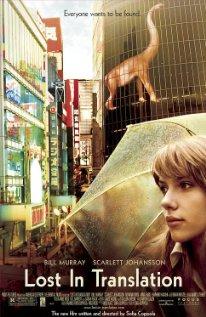

I lost a world the other day.
Has anybody found?
~Emily Dickinson~
So many words; so little understanding.
So many images; so little presence.
So much light; so little warmth.
So many people; so little friendship.
So much solitude; so little peace.
So many distractions; so little happiness.
So many comforts; so little rest.
Lost in Translation, an important film for our time, gives words and images to the lost loneliness of our generation. The deep longing of our heart for what we want more than anything, more than sex. To be found, to be understood, to belong, to be human.
Bob (Bill Murray) and Charlotte (Scarlett Johansson), surrounded by all things affluent and larger than life, lonely, meet in the ultramodern Tokyo hotel and share a friendship wrapped in sweet comic sadness. Bob, a famous big-screen actor whose glory is fading, has come to Tokyo to shoot a commercial for Santory whiskey. Has his career come to this? Is he anything more than the digitally-projected image he has created? His media-enriched persona is recognized internationally, but does anyone know who he is? Charlotte, newly married, has come to Tokyo with her husband, a photographer whose driving ambition is capturing the images of rock stars and beautiful people. Has intimacy been lost to infatuation? Will she have value and meaning apart from becoming yet another icon captured in her husband’s lens? Her husband is passionate about immortalizing the fame of celebrities, but will he be content to walk with her in the very mortal world of hopes and hurts?
Lost in Translation is an exquisite film, magnificently conceived and created by Sofia Coppola. This is only her second feature film (The Virgin Suicides, 2000), but she has undoubtedly inherited much from her father, Francis Ford Coppola (Godfather trilogy), a film legend. David Edelstein (Slate) says that she “put the longing for human connection into your bloodstream from the first frame.” Indeed, she does. The performances by Murray and Johansen are tremendous — certainly Murray’s finest hour worthy of the Oscar nomination awarded him.
As you watch the film, absorb many of its subtle elements. Sound, and the way the noise of the world falls on the ear of someone who is lost and disconnected. Light, and the way the world is illuminated to someone who longs for a hopeful tomorrow. Windows, and what a panoramic view of the world brings to someone who is lonely. Images, and how someone without a certain center is known. Desire, and the hunger for something more than physical gratification. Distance, language, a shirt, a wig, reflections in glass — all these provide harmony to the major melody of Lost in Translation.
Are the faces reflected in the window our own, or perhaps well-crafted projections that mask our true self? Is the ironic laughter floating across the room the sound of a heart longing to be known, loved? The sights and sounds of Lost in Translation are all familiar to the world as we know it, but do we understand what those sights and sounds really mean?
-Steve Froehlich


